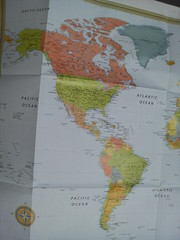There is a pop band that is famous all over the American continent. It has filled venues in Brazil, Argentina, the United States, Colombia and Mexico.
Their name is RBD, and they're a marketing offshoot of a very popular opera by Televisa, "Rebelde".
Their music is rather plastic (as is the "band"), but they are a money-making machine. They have been involved in a series of scandals, such as when 3 people died in an autograph-signing session in Sao Paulo in 2005, and when one of their singers confessed to being gay a few months ago.
Why do I talk about them, if their music (and the overall concept) seems to me rather bad? Because, firstly, I believe they're a perfect example of the power of telenovelas and the marketing around them as a mostly Latin American phenomenon with an expanding reach. Furthermore, I wouldn't be surprised they would cross-over to the English-language worldwide market, as was the case with Shakira and Ricky Martin.
